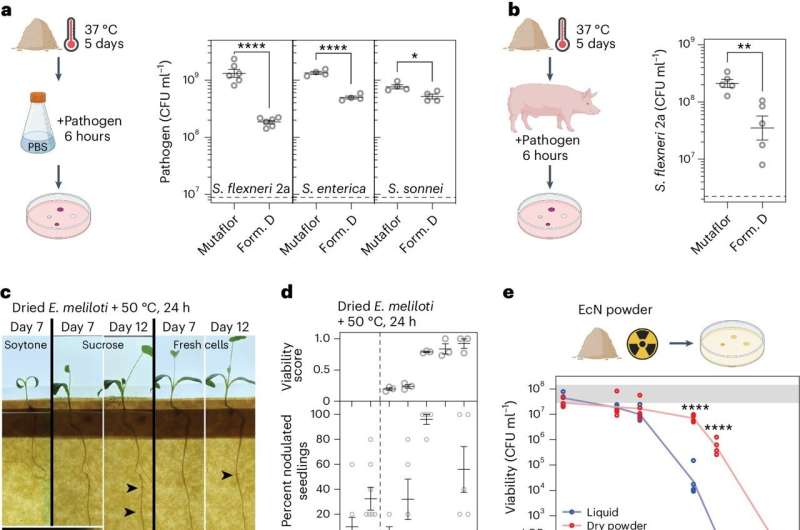This article has been reviewed according to Science X's editorial process and policies. Editors have highlighted the following attributes while ensuring the content's credibility:
fact-checked
peer-reviewed publication
trusted source
proofread
Research team develops new way for beneficial microbes to survive extreme conditions and space exploration

A team of researchers from Brigham and Women's Hospital have created formulations that allow microbial therapeutics, including those used to treat gastrointestinal diseases and improve crop production, to maintain their potency and function over time despite extreme temperatures, harsh manufacturing processes, and radiation exposure.
Extremophiles, microbes that live in harsh environments such as Yellowstone's hot springs or far beneath the ice of Antarctica, provide fascinating insights on the history and potential of life on Earth and the universe beyond.
Humans have used microbes to help produce food and medicine for thousands of years, but modern applications face immense challenges in ensuring that microbial products, such as probiotics, remain viable through production, transportation, and storage.
The team of investigators from Brigham and Women's Hospital, a founding member of the Mass General Brigham health care system, and MIT began researching how to send materials like probiotics into space and to better treat a variety of gastrointestinal (GI) and metabolic diseases.
To do this, they developed synthetic extremophiles by mixing microbes with different materials to make them shelf-stable without refrigeration and able to withstand conditions such as extreme temperatures, manufacturing processes, and even radiation encountered in space flight. Their results are published in Nature Materials.
"This ability to stabilize potential therapeutics or other interventions could be transformative in a variety of settings including health care, agriculture, and space exploration," said corresponding author Giovanni Traverso, MD, Ph.D., MBBCH, a gastroenterologist in Brigham's Division of Gastroenterology, Hepatology, and Endoscopy and MIT's Department of Mechanical Engineering.
"We have found that this can be done without the need for temperature-controlled supply chain processes, which can be very costly and limiting."
A focus of Traverso's lab has been making medicines more stable and enhancing their abilities to be absorbed through the GI tract. Recently, the team began investigating how to stabilize probiotics by testing a range of over-the-counter products to see if there was discrepancy between what was listed on the package and the viable material they contained.
They found that many of the products contained a much lower level of active cells than was listed on the label. These findings, along with a growing need to be able to send materials like probiotics into space and to better treat a variety of GI and metabolic diseases, inspired the team to attempt to develop synthetic extremophiles.
For this study, the team tested more than 2,000 material microbe combinations and found unique stabilizers for three types of bacteria and one yeast, organisms which are actively being used to treat diseases and improve crop production. The four microbes were mixed and matched with an extensive panel of ingredients from the Food and Drug Administration's "generally regarded as safe" list.
These solutions were then put through manufacturing processes such as freezing, drying, milling, and wet granulation to see which ingredients helped stabilize and maximize their viability.
The team also tested for materials that maintain shelf-stability and viability at room temperature for longer periods of time, as well as after exposure to high temperatures, high pressure, solvents, and ionizing radiation.
They found that these microorganisms could not only survive the extreme conditions, but they also maintained their potency and function for extended periods of time without refrigeration. Notable examples included one type of bacteria that remained functional at treating traveler's diarrhea and another commonly used for fixing nitrogen in the soil that also remained viable.
The team will continue to develop these systems and is currently working with the Bill and Melinda Gates Foundation to investigate their potential use in women's health and neonatal care. "This approach has the potential to influence and inform our ability to deploy very useful microbes across a range of areas," said Traverso.
More information: Miguel Jimenez et al, Synthetic extremophiles via species-specific formulations improve microbial therapeutics, Nature Materials (2024). DOI: 10.1038/s41563-024-01937-6





















